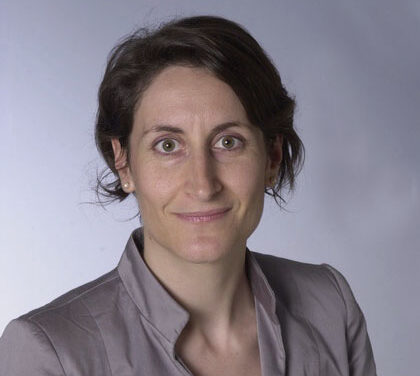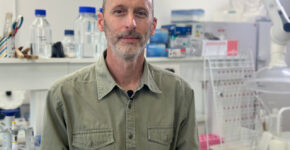Journey through public law with Pascale Idoux
Pascale Idoux is a professor and researcher in public law and talks about her discipline as others talk about birds: by taking you on a journey. During an hour spent within the walls of an office at the Faculty of Law and Political Science, she takes us on a journey from the European Organization of Public Law to the training program at the Institut de l'Entreprise, via nuclear law, the Institut Universitaire de France, and, of course, the University of Montpellier.

" One day, a colleague from another discipline jokingly asked me: 'But what does a legal researcher actually research? Articles in the code? ' He made me laugh! I know it's not always easy to understand what we do in this institution. With a smile that is visible even behind her mask, Pascale Idoux has the look and simplicity of those who are passionate about their work. And a CV as thick as a legal encyclopedia.
Are you unfamiliar with legal references? Pascale Idoux starts from the beginning, setting the scene. The law? " A toolbox," replies the researcher. "The law is effective or successful when social, economic, and political relations are running smoothly. There is always friction, but the law is a tool for regulating, pacifying, giving concrete form to values, and strengthening the collective. Public law? " It's the law that applies to public institutions, i.e., the state, local authorities, universities, etc. It also governs relations between public institutions and private individuals. It's a topical issue with the health measures that severely restrict individual freedoms."
Skillful referral
As with any good portrait, we set out to find the initial spark, the thing that triggered her vocation for public law. The answer comes with a laugh: " You're going to find this funny." She then goes back to her first year of law school at the University of Montpellier. She was a young high school graduate who was more interested in philosophy and history. Knowing nothing about law, she chose constitutional law and legal history as her electives, thus excluding civil law. " It was when I got to know the others that I realized that civil law is the basis of the basics. In a lecture hall of six hundred, there were only two or three of us who hadn't taken civil law. It was too late to change, but luckily I liked it. " The path that followed is enough to restore confidence to any students who might be doubting their choices.
The student, who was poorly (and) fortunately guided, eventually became a doctor and then a teacher-researcher. This dual status soon led her to new challenges and new topics. She took up the torch of the International School of Nuclear Law after its founder retired. " It was a very original creation in Montpellier, a kind of summer university that awarded a university diploma. We had 60 different nationalities, people who asked terrible legal questions, such as insurers who were looking into how to insure nuclear risk! It was quite a mind-blowing experience. "After becoming a professor of administrative law, a branch of public law, at the University of Montpellier, in 2009 she became co-director of the applied public law program and then co-director of the master's program, now renamed public law and litigation. She still holds this position, while also heading the scientific department of law and political science.
Europe: a Copernican revolution
On the research side, she became a member of CREAM, the Center for Research and Administrative Studies in Montpellier. Public law offers many avenues for research, some of which naturally bring you closer to the chambers of parliament. " Public law researchers must engage in forward thinking, projecting themselves into the future to try to anticipate legal problems and help generate ideas. It's not when an amendment is tabled in the middle of the night in the National Assembly that you have time to launch a wide-ranging discussion."
In 2012, it crossed the border of French law and became a member of the European Public Law Organization (EPLO). Based in Greece, EPLO organizes an annual scientific event bringing together academics from across Europe. " It's a place where we discuss major public law issues with lawyers from several countries, including academics and state councilors or their equivalents in other countries. And there too, in terms of culture shock, it can sometimes be quite a shock! "
For the researcher, the transition to the European framework represents THE Copernican revolution in her discipline, public economic law. She devotes herself avidly to this subject, noting that in order to build Europe, states have had to dismantle entire sections of their laws without systematically putting in place a real common project. This issue is at the heart of a collective work (1) that she co-edited with Jean-Bernard Auby. " The difficulties in supplying masks and then the problems with vaccination are now making Europe aware of its shortcomings. After removing all obstacles to the movement of activities and goods from one country to another, how can public law now be used to help build a proactive common economic and industrial policy? "
At the intersection of disciplines
In 2013, Pascale Idoux joined the Institut universitaire de France for a five-year period as a junior member. This status opened the doors to the Institut des hautes études de l'entreprise (IHEE), which took her and around 40 other people on a unique year-long adventure. " We were a fairly diverse group, including journalists, trade unionists, young entrepreneurs from the CAC 40, politicians, magistrates... Every so often, this little group would hop on a bus, train, or plane to visit companies, attend conferences, and debrief together. " From this experience, the researcher developed a taste for meeting new people and interdisciplinarity. " We all came from broadly similar socio-professional backgrounds and shared common interests and reading material, yet we didn't approach things in the same way, and that taught us to be wary of ourselves."
This crossover between disciplines ultimately led her to specialize in public economic law, which would prove to be her definitive calling. As she began working with regulatory authorities such as the CSA (Conseil supérieur de l'audiovisuel) on ways to adapt to the emergence of digital platforms such as Netflix, she realized that in order to further her legal expertise, she also needed to understand economics. " At that point, itwas invaluable to me to have economist colleagues who were highly skilled in their discipline but able to explain to me in simple terms the background to the economic debates I was discovering as a lawyer. I then understood the usefulness and pleasure that can be derived from these exchanges of views. " She maintains a constant link with economics by updating every two years the public law of economics textbook founded in the 1990s by Montpellier professor Jean-Philippe Colson.
From digital technology to communications law
It was during this assignment for the CSA that she reconnected with electronic and digital communications law (2). " I'm very interested in this because it completely redefines the scope of rules and authorities. It's exciting to try to understand the phenomena that are revolutionizing or reshuffling the deck in our areas of expertise." Pascale Idoux is interested in the issues at stake, the decision-making practices of regulatory authorities, and communications law, publishing columns on this hot topic. " Can Twitter shut down the account of a sitting president? How much responsibility should platforms be given in the fight against illegal content? These are examples of questions we might ask ourselves, " she explains.
Another example is the sanction imposed by the CSA on the Cnews channel following discriminatory comments made on air by one of its commentators. This is a highly sensitive public law issue that raises questions about the fragile balance between freedom of expression and regulatory oversight of what can and cannot be broadcast. "This is an area that causes a lot of concern among lawyers. Our field is changing and constantly interacting with society, which allows me to take an interest in many things, without ever forgetting to come back to the central question: How do all these big issues affect my small area of expertise?"
(1) European Economic Governance, 2017, edited by Jean-Bernard Auby and Pascale Idoux, administrative law collection, Bruylant Publishing
(2) This month, she is publishing a book entitled Numérique, droit et justice (Digital Technology, Law, and Justice), published by CREAM, with Christophe Albiges and Laura Milano, two colleagues from the University of Montpellier.
